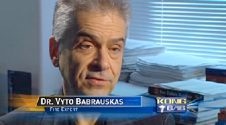'Alarm Bells Ring for the Most Common Smoke Detectors'





"There is a technology that is more likely to save your life vs. less likely," says Dr. Vyto Babrauskas. The Issaquah fire expert, the first person ever to earn a PhD in fire science, is a former senior government fire researcher and is probably one of the few people to read the fine print in the government's massive 2004 [NIST] smoke detector study.
He's surprised that researchers gave a passing grade to the most common type of household smoke alarm - the ionization model. “Their own data do not support that.” says Dr. Babrauskas.
by Chris Ingalls, King5 News, Seattle, WA, USA - 17 March, 2009
Watch the video Here > > >

"There is a technology that is more likely to save your life versus less likely."
Dr Vyto Babrauskas is the first person ever to earn a PhD in Fire Science. A former senior government fire researcher and probably one of the few people to read the fine print in this - the government's massive, 2004 smoke detector study. He's surprised that the test researchers gave a passing grade to the most common type of household smoke alarm, the ionization model.
"There own data does not support that."
The study tested ions, head to head against lesser used photoelectric models, the technology that sounded first in our demonstration. Researchers found ions are seconds faster at detecting flaming fires, a life-saving advantage the study says, in detecting a fast growing fire.
But the ions averaged 30 minutes slower in smoldering fires which spread deadly smoke. Dr Babrauskas says smoldering fires are silent killers that often strike when you most need an alarm.
"When you are asleep, the kind of fire that is likely to arise is smoldering rather than flaming."
"Your research shows that?"
"My research shows that."
Homeowners have been schooled in the report's bottom line message - that either type of smoke detector provides adequate protection, including ions which have had the government's seal of approval.
"The government's simply running on idle and resuscitating the old stuff out of their historical files and saying,
”We don't need to change those conclusions.”
Well, folks you do.”

Dr Vytenis ‘Vyto’ Babrauskas
world’s first Fire Science Phd
Dr Babrauskas was surprised researchers gave a passing grade
to ionization smoke alarms
Dr Vyto Babrauskas
Dr Vyto Babrauskas has three university degrees including a PhD in
Fire Protection Engineering and is a former US Government senior fire
researcher. He conducted fire research at the US Government’s
National Institute of Standards and Technology (NIST) for sixteen years.
In March 2009, Dr Babrauskas appeared on 'K5 Investigates'
questioning NIST’s 'seal of approval' for ionization smoke alarms.
He says that despite NIST claiming ionization smoke alarms provide
adequate protection, the data contained within their 2004 ‘Home
Smoke Alarm Tests’ (HSAT) refutes their claim. NIST’s 2004 research
is relied upon by Fire Departments and the Fire industry globally.
www.DoctorFire.com


Dr Vyto Babrauskas
Why does NIST’s research
“pass” ionization alarms when its
“own data does not support that”?

K5 Investigates Ionization Alarms

"The government's simply running on idle and resuscitating the old stuff out of their historical files”




(c) Copyright 2010 The World Fire Safety Foundation | Last Updated: 18 Jan, 2010 | Privacy Policy | Disclaimer | Search WFSF site
For errors on, or suggestions for this ‘drfire’ webpage, contact the WFSF WebMaster | Supporters | About | Media